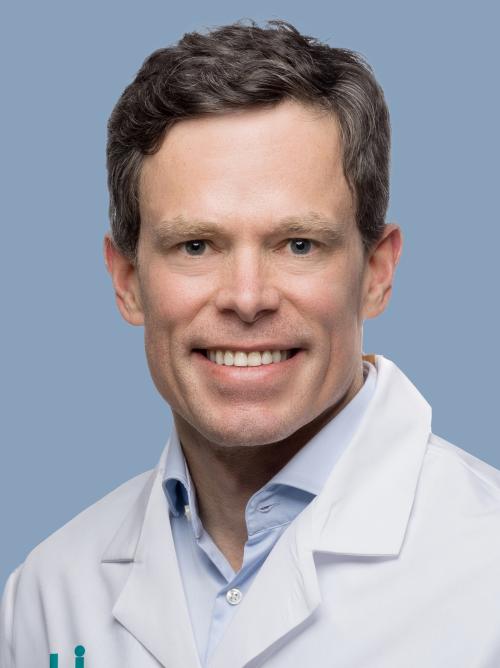Gender-affirming Care from Dr. Mark Weidenbecher
Jun 22, 2023

Optum shared the following article about Unity Health Network's Dr. Mark Weidenbecher, Otolaryngology, in their June Newsfeed.
Pride Month: Giving a voice to patients
Tori Brittain, a transgender woman, recalls constantly straining her voice in the past to sound more feminine.
“When I heard my voice in a recording, I would cringe. You could just hear a guy’s voice,” she says.
When people feel their voices don’t match their gender identity, it can lead to discomfort, distress and safety concerns, including harassment or worse.
Nonsurgical interventions such as voice therapy can help people adapt their voices to better match their gender identity. If needed, another option is surgery that alters vocal cord length to change the pitch, or how high or low the voice sounds. Similar to how a guitar string’s length determines its pitch (i.e., with shorter strings producing a higher pitch), shortening vocal folds leads to higher-pitched sounds, while reducing their tension (increasing the slack) tends to produce a lower pitch.
“Voice surgery is just one component in the (gender) transition process, but the voice in particular is important as a communication tool,” says Dr. Mark Weidenbecher, a board-certified otolaryngology-head and neck surgeon who recently joined Unity Health Network in Ohio. “When you speak to someone, you rely on the voice, the tone and the melody.”
Mark’s expertise includes gender-affirming care, such as tracheal shave (to reduce the size of an Adam’s apple) and vocal surgery to masculinize or, more commonly, feminize people’s voices. He is an advocate for underserved populations, including transgender and gender-diverse individuals.
“As I started talking with these patients about their backgrounds and the difficult transitioning process, I understood more about their challenges in life, socially and professionally,” says Mark, who has worked for many years with various PRIDE and LGBT centers. “It is something that really clicked with me, and I wanted to help.”
Tori’s Story
As a young adult, Tori began the transition to living as a woman. Feeling happier than ever, she started medical interventions, including hormone therapy and eventually a series of gender-affirming surgeries that took place over nearly a decade. Mark performed her final surgery, vocal feminization.
“After the surgery, I don’t have to worry about sounding male,” Tori shares. “It’s made my quality of life a lot better and had a very positive impact — all the surgeries have — but this one in particular.”
Tori Brittain 2 In addition to being happy with the surgery’s outcome, Tori was impressed by Mark’s bedside manner and how he made the entire process smooth — from providing a thorough consultation to working with her insurance.
She suggests that people who are considering gender-affirming care be patient and do their due diligence and research, rather than going with the first provider they find. She feels lucky to have found Mark, whom she credits for his phenomenal after-care as well.
“He is the only surgeon I’ve had who calls me every six months to see how I’m doing,” she says.
From growing windpipes to treating “vocal athletes”
Growing up in Germany, Mark was exposed to medicine at an early age through his father — also an otolaryngology, or ear, nose and throat (ENT) specialist — who would take him on rounds at the hospital.
Mark went on to medical school and a residency in otolaryngology in Germany. As he gained a greater understanding of the body’s complex anatomy, he was drawn to specialty surgery. In particular, an interest in upper airway surgery led him to Case Western Reserve University’s (CWRU) research lab in Ohio, where he researched growing of windpipes from stem cells to help patients with narrowed airways breathe better and get rid of tracheostomies (hole in the neck).
He completed a second medical residency in otolaryngology at CWRU, followed by a laryngology fellowship (specialty training for vocal cords) at Massachusetts General Hospital – Harvard Medical School, where he trained with a renowned surgeon and further honed his skills, operating on famous singers and actors.
“I got a very good understanding of what vocal cords do and how complex it is to speak and to vocally perform,” he shares. “I saw ‘vocal athletes’ who were performing at a very high level.”
After that, he returned to Cleveland and started building his medical practice. His focus areas include treatment of head and neck cancer (including those that involve the throat, tongue and/or voice box), sleep apnea surgery, and vocal cord and voice surgeries.
“Working in the ENT field, body parts are so small compared to other subspecialties,” Mark says. “I really enjoy the microscopic procedures and working with a very high degree of precision.”
A gender-affirming care journey
Over time, Mark has observed a greater overall acceptance of gender-affirming care and has treated an increased number of patients. However, he acknowledges that there are still obstacles to accessing care.
Historical discrimination and stigma may prevent patients from seeking care in the first place. In addition, depending on where patients are located, they may struggle to find a surgeon who can perform these complex vocal procedures, as it’s a relatively rare subspecialty. Also, affordability can be an issue, as insurance coverage of gender-affirming care varies.
Changing a person’s voice is a lengthy process that can take years and often involves specialized voice therapy — as a standalone effort or to complement voice surgery — to teach people about adjusting their vocal pitch, resonance, intonation, vocal behaviors, use of nonverbal communication such as hand gestures, and more.
As part of a comprehensive approach to care, Mark partners with a team of experienced speech therapists, but he says it can be a challenge to find experts across the country who are located near patients and familiar with this area.
Despite the challenges, he encourages people who are considering gender-affirming care to consult with providers on their options and to know that help is available. Mark finds his career rewarding, especially as he sees improvements in his patients’ quality of life, self-esteem and demeanor.
“When patients return for the follow-up visits, they sometimes walk differently into the office,” he says. “The tone of their voice is different. They just have a boost of confidence. It’s a great feeling that you can help people.”
Learn more about Dr. Mark Weidenbecher here.




